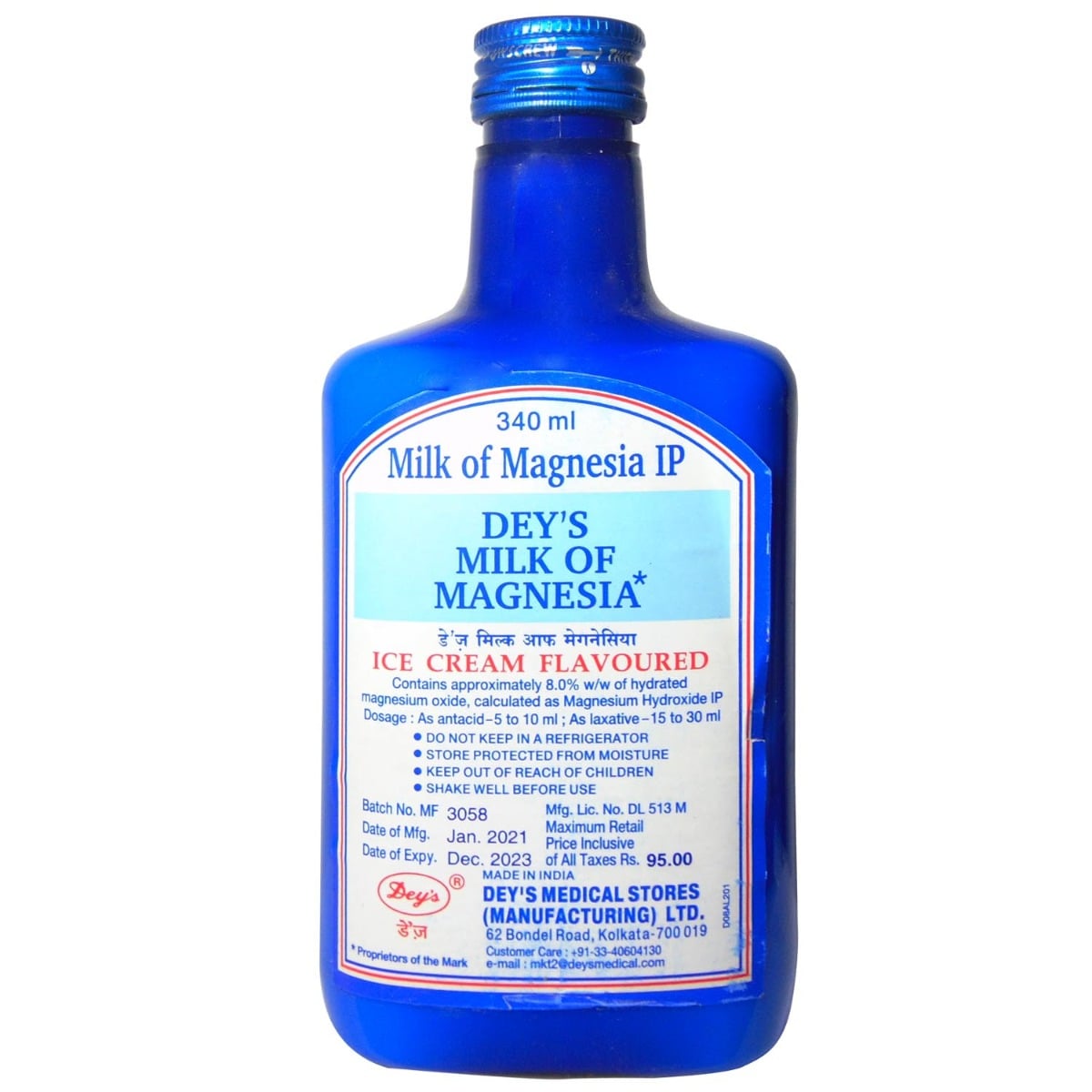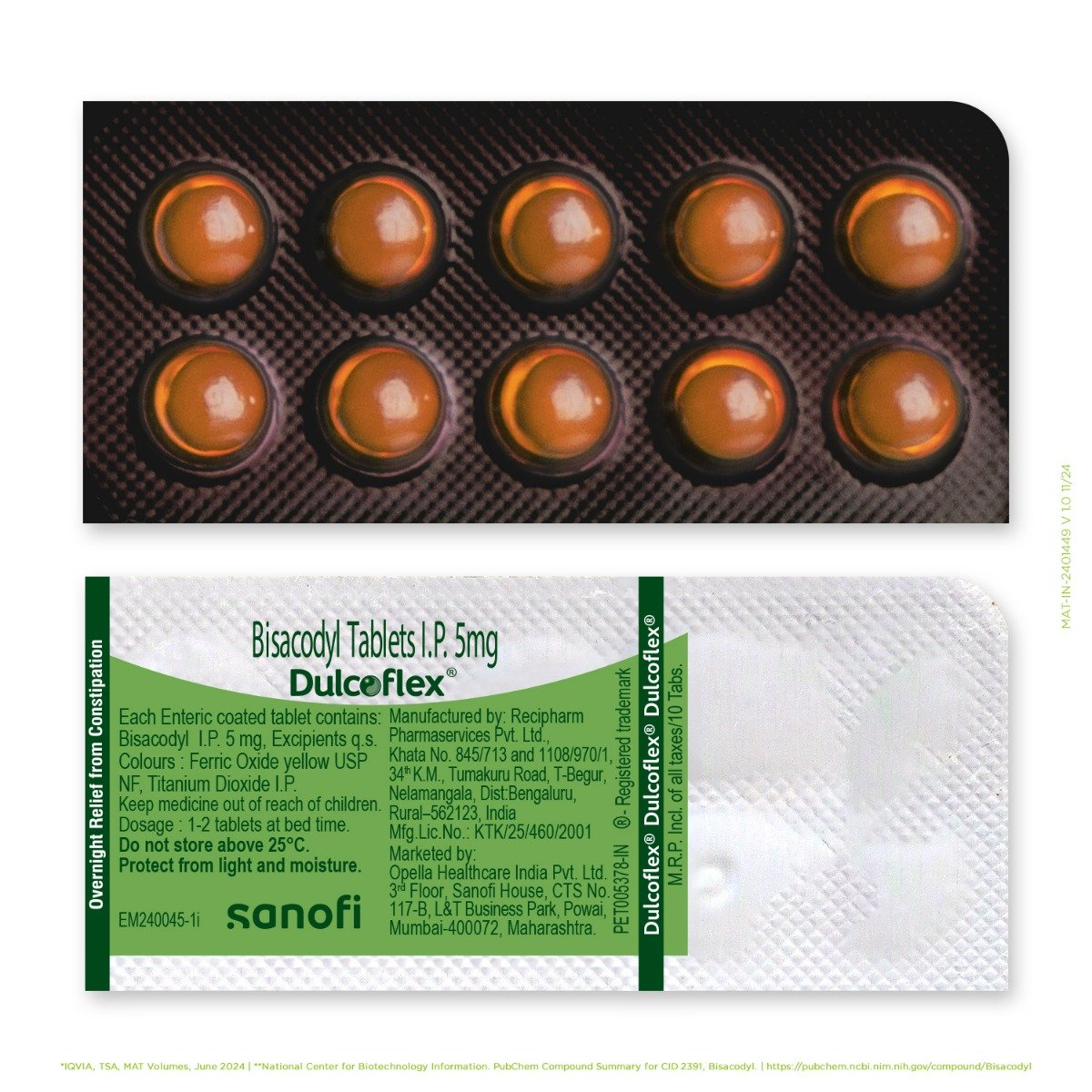Deys Milk Of Magnesia 340 ml


MRP ₹103
(Inclusive of all Taxes)
₹3.1 Cashback (3%)
Know Your Delivery Time
Provide Delivery Location

Secure Payment

India's Most Trusted Pharmacy

Genuine Products
Manufacturer/Marketer :
Consume Type :
Return Policy :
Expires on or after :
Description
Dey's Milk of Magnesia is a versatile over-the-counter medication containing magnesium hydroxide. When taken in larger doses (15-30ml), it acts as a laxative, relieving constipation by drawing water into the intestines. Smaller doses (5-10ml) function as an antacid, neutralizing stomach acid and providing relief from heartburn and indigestion.

Have a query?
Directions for Use
For Constipation Relief:
Dosage: Typically, 15-30ml for adults.
Timing: Best taken at bedtime as it takes several hours to work.
For Heartburn or Indigestion:
Dosage: Generally, 5-10ml.
Timing: Can be taken as needed, up to four times a day.
General guidelines:
Shake the bottle well before use.
Follow the recommended dosage and frequency.
Drink plenty of water with each dose.
Note:
Do not exceed the recommended dosage.
If symptoms persist or worsen, consult a healthcare professional.
Side effects
- Nausea
- Diarrhea
- Abdominal cramps
Key Benefits
- Effective relief from occasional constipation by softening stools and promoting bowel movements.
- Neutralizes stomach acid, providing relief from heartburn, indigestion, and acid reflux.
- Rapid action, often providing relief within a few hours.
- Widely available and affordable over-the-counter medication.
- Available in a pleasant ice cream flavour for improved taste.
Safety Information
Consult a doctor: If you experience severe abdominal pain, persistent diarrhea, or other unusual symptoms, seek medical attention promptly. Follow the recommended dosage: Adhere to the instructions on the product label or as directed by your Pregnancy and breastfeeding: Consult your doctor before using Dey's Milk of Magnesia if you are pregnant or breastfeeding. Overuse can lead to dependency and other side effects. Short-term use: Dey's Milk of Magnesia is intended for occasional use. Prolonged use might indicate an underlying health issue. Consult your doctor if constipation persists. Hydration: Drink plenty of water while using Dey's Milk of Magnesia to prevent dehydration. Interactions: Inform your doctor about any other medications you're taking, as Dey's Milk of Magnesia might interact with them. Children: Use with caution in children and always under adult supervision.
FAQs
Dey's Milk of Magnesia is an over-the-counter medication containing magnesium hydroxide. It's used to relieve occasional constipation and heartburn.
As a laxative, it draws water into the intestines, softening stools. As an antacid, it neutralizes stomach acid.
Generally safe when used as directed. However, it's essential to follow the recommended dosage and consult a doctor if you have underlying health conditions.
As a laxative, Dey's Milk of Magnesia usually takes 6-8 hours to work. As an antacid, Dey's Milk of Magnesia provides relief almost immediately.
No, it's intended for short-term use. Prolonged use might lead to dependency.
Common side effects of Dey's Milk of Magnesia include diarrhoea, abdominal cramps, and nausea.
Limited research is available. So, please consult a paediatrician if you need further information.
Apollo247 is committed to showing genuine and verified reviews
Customer Reviews
1 Ratings
1 Reviews
5 star
0%
4 star
0%
3 star
0%
2 star
0%
1 star
100%
Verified Buyers Reviews
A
Anonymous
Posted at Nov 10, 2025
I am trying to get it but they are telling that I need a membership but my Grandmother is dying from constipation and I need so that he wont have it any more
Pack: 340 ml Liquid
Country of origin
Manufacturer/Marketer address
In the Spotlight
Disclaimer
Buy best Otc products by
Others
Himalaya
DOCTOR S CHOICE
Dabur
NICOTEX
AMRUTANJAN
APOLLO PHARMACY
VICKS
COFSILS
VOLINI
BAIDYANATH
ENO
ZANDU
DIGENE
IODEX
WHOLELEAF
GAS-O-FAST
MOOV
DETTOL
RELISPRAY
BOROLINE
MY DR.
PANKAJAKASTHURI
SOFTOVAC
WEST COAST
AIMIL
CANNABLISS
CROCIN
MILLENNIUM HERBALS CARE
NASOCLEAR
OTRIVIN
PATANJALI
RYZE
SWASTIK
TIGER BALM
TORGEM
DR. MOREPEN
DR. ORTHO
Hansaplast
VOVILUP
ZIXA
ADONIS
CHARAK
Elements
MONISON S
OMNIGEL
SENSUR
VASU
APSARA
Amore
BASIC AYURVEDA
BRUFEN
CANNARMA
EMAMI
MEDOPHARM
NASELIN
NASIVION
POLYCROL
SAVLON
ALARSIN
AMRUT
AXE BRAND
BENADRYL
BETADINE
BOROPLUS
DATT
Gold Medal
KAILAS JEEVAN
LEEFORD
PHONDAGHAT
PUTTUR
SAT ISABGOL
SRI SRI TATTVA
STREPSILS
Saridon
Shree Dhanwantri Herbals
Tynor
VAPORIN
2BACONIL
ADULSA
AMRITH NONI
Carmicide
Dulcoflex
GUMEX
HAMDARD
HIMANI
KWIKNIC
LARLA
LAXMI ISABGOL
MAHARISHI AYURVEDA
NOSMOK
PET SAFFA
RENU
SIDDHAYU
SISLA
Wild Deer
ALMAA
APOLLO LIFE
ARKASHALA
ASHWIN
Cipla Health Ltd
The Himalaya Drug Company
GlaxoSmithKline Consumer Healthcare Ltd
Reckitt Benckiser India Ltd
Medsmart
Dabur India Ltd
Emami Ltd
Amrutanjan Health Care Ltd
Sun Pharmaceutical Industries Ltd
Procter & Gamble Hygiene And Health Care Ltd
Abbott India Ltd
Mankind Pharma Pvt Ltd
Lupin Ltd
Shree Baidyanath Ayurved Bhawan Pvt Ltd
Charak Pharma Pvt Ltd
Divisa Herbals Pvt Ltd
Piramal Enterprises Ltd
Midascare Pharmaceuticals Pvt Ltd
Whole Leaf Organics Pvt Ltd
G D Pharmaceuticals Ltd
Adonis Laboratories Pvt Ltd
Med Manor Organics Pvt Ltd
AIMIL Pharmaceuticals (India) Ltd
LEUNG KAI FOOK MEDICAL COMPANY (PTE) LTD
MILLENEIUM HERBAL CARE
Morepen Laboratories Ltd
Pankajakasthuri Herbals India Pvt Ltd
Zydus Healthcare Ltd
APOLLO HEALTHCO LIMITED
GlaxoSmithKline Pharmaceuticals Ltd
Itc Ltd
SHREE DHANWANTRI HERBALS
TORGEM PHARMACEUTICALS
West Coast Pharmaceuticals Pvt Ltd
Gardenia Cosmocare
Hemp Organics Pvt Ltd
Jenburkt Pharmaceuticals Ltd
Sanofi India Ltd
VECTURA FERTIN PHARMA PVT LTD
Wings Pharmacuticals Pvt Ltd
Beiersdorf (india) Pvt Ltd
IPI INDIA PVT LTD
Patanjali Ayurved Limited
Procter & Gamble Health Ltd
VISHNU COSMETICS
Vasu Healthcare Pvt Ltd
Win Medicare Ltd
BAUSCH & LOMB INDIA PVT LTD
Element Pharmaceuticals Pvt Ltd
Integrace Pvt Ltd
Leeford Health Care Ltd
MONJI VISHRAM & CO
Meyer Organics Pvt Ltd
AMORE HEALTH ESSENTIALS PVT LTD
Alarsin Pharmaceuticals Pvt Ltd
Apex Laboratories Pvt Ltd
Basic Ayurveda Limited
Cannarma Private Limited
Johnson & Johnson Pvt Ltd
Leeford Healthcare Ltd
Meridian Enterprises Pvt Ltd
Rusan Healthcare Pvt Ltd
SACHDEV SURGICALS PVT.LTD
Sugam Healthcare LLP
AMRUT PHARMACEUTICALS
Alkem Laboratories Ltd
Ayurved Sumshodhanalaya (Pune) Pvt Ltd
DATT MEDIPRODUCTS LTD
Elan Pharmaceuticals Pvt Ltd
Galderma India Pvt Ltd
Glaxosmithkline Asia Pvt Ltd
Gufic Bioscience Ltd
Hegde & Hegde Pharmaceutica Llp
Innovative Life Sciences Pvt Ltd
J B Chemicals & Pharmaceuticals Ltd
Jntl Consumer Health (India) Pvt Ltd
PARACHEM PHARMACEUTICALS PVT LTD
PRAISE PHARMACEUTICALS PVT LTD
RETORT PHARMA PVT LTD
Riaan Wellness Pvt Ltd
STRIDE CONSUMER PRIVATE LIMITED
Siddhayu Healthcare Pvt Ltd
Sri Veda Sattva Pvt Ltd
THE SIDHPUR SAT ISABGOL FACTORY
Tynor Orthotics Pvt Ltd
Varma Industries
Zuventus Healthcare Ltd
Ajanta Pharma Ltd
Ayurchem Products
Bayer Pharmaceuticals Pvt Ltd
Brinton Pharmaceuticals Ltd
Dr Willmar Schwabe India Pvt Ltd
Elan Pharma India Pvt Ltd
GIRIRAJ ENTERPRISE
Hamdard Laboratories India Pvt Ltd
JAJOO SURGICALS PVT LTD
MAHATREYA HERBALS
Macleods Pharmaceuticals Ltd
Maharishi Ayurveda Products Pvt Ltd
Medilab India
Pain Relief Oil
ANTACID
ANTISEPTIC
COUGH SYRUP
CONSTIPATION
Pain Relief Balm
Lozenges
Pain Relief Gel
Pain Relief Spray
SWAB & GAUZE
Nicotine Gummies
Cotton
Eye Drops
FUNGAL INFECTION
Pain Relief Roll-On
Bandage
Pain Relief Ointment
Nasal Spray
Pain Relief Cream
Pain Relief Liniment
Castor Oil
PAIN RELIEF TABLET
EYE SOLUTION
Firstaid Kit
COLD RUB
Nasal Drops
BODY CREAM
Inhaler
Nicotine Patch
Dental Gel
Pain Relief Patch
TAPES & BANDAGES
Glycerin
Mouth Paint
Nicotine Lozenges
BODY GEL
MEDICATED CREAM
CRAMP RELIEF
HOSPITAL SUPPLIES
COLD TABLET
Clove Oil
EAR DROPS
SPECIALITY SUPPLEMENT
Corn Caps
Essential Oil
Face Cream
Gargle
Nasal Wash
Pain Relief Rub
STEAM POD
Body Scrub
Choorna
Dental Paint
Pregnancy Kit
Tooth Paste
BURNS
Cough Syrup
Dental Drops
Dressing
HAIR SOLUTION
Intimate Wash
Lozenge
Mouth Ulcer Gel
Adult Nutrition Drink
Ayurvedic Syrup
BABY DIGESTION
Body Lotion
Body Spray
CALCIUM
Dental Lotion
Disinfectant Cleaner
Disinfectant Liquid
Eye Ointment
Face Gel
Hair Lotion
Hair Mask
Hair Oil
Heating Pad
Herbal Tea
Insect Killer
MULTIVITAMIN
Massage Oil
Nasal Gel
Nasal Oil
Pain Relief Syrup
Patches
Protein Powder
SUGAR SUBSTITUTE
Specialty Supplements
Tulsi
Vegetable wash





